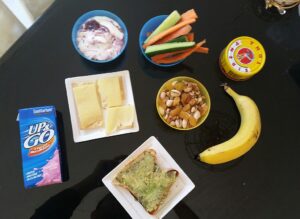For most people, snacking is a healthy way to maintain or lose weight—if you snack correctly. One of the main reasons for the importance of snacking is that snacking breaks long fasts between meals that result not only in overeating, but also blood sugar responses that promote weight gain.
 More and more experts agree on the importance of snacking to healthy weight management.
More and more experts agree on the importance of snacking to healthy weight management.
Less Eating = More Calories Stored
Let’s say you decide to skip breakfast each day, eating only lunch and dinner. If you eat dinner at 6 pm and lunch the next day at 12 pm, your body will go 18 hours without food. When it finally gets calories, it will create a blood insulin response that promotes fat storage and weight gain, according to Mayo Clinic nutritionist, Katherine Zeratsky.
Eating 1,000 calories at lunch and 1,000 calories at dinner is not the same as eating those 2,000 calories in three meals and two snacks. Eating smaller amounts lets your body metabolize those calories better. If you eat once each day, you’re raising your metabolism significantly at one time and your body can’t metabolize all of those calories. So, it stores some of them—as fat.
Eating 500 calories for breakfast, 200 calories for a mid-morning snack, 500 calories for lunch, 200 calories for an afternoon snack and 600 calories for dinner is still 2,000 calories, but much better for you than eating two, 1,000 calorie meals. You could even eat your dinnertime dessert a couple of hours after dinner to spread your calories even more.
The jury is out on whether eating throughout the day will burn enough extra calories to cause any real weight loss. However, most experts agree on the importance of snacking is that spreading your calories throughout the day is better for your metabolism. You’ll end up eating fewer calories during the course of a day and less weight gain.
Fewer Meals = More Calories Eaten
In addition to your body’s response to the calories it gets after long fasts, you are likely to be so hungry at lunch and dinner, you’ll eat more calories than you need, for two reasons. The first reason is that you will be “starved” and take a large plate of food at home or order more than you need when you’re at a restaurant.
The second reason you’ll overeat is because you will most likely eat quickly, which leads to overeating.
If you snack correctly during the day, you’ll keep food in your stomach and your body fueled from early morning until the evening, preventing hunger pangs that lead to overeating and bodily responses that lead to weight gain.
As an experiment, researchers at the University of Witwatersrand Medical School fed one group of men a single, regular breakfast, and another group of men the same amount of calories split equally into five servings over five hours. The men who split their morning calories ended up eating almost 30% fewer calories for lunch than men who ate only once in the morning.
Snack Correctly
Snacking will only help you lose or maintain weight if you do it properly, which means proactively. You’ve probably been told that snacking is not good for you, because many people snack reactively (when they’re hungry). You need to plan snacks, not reach for food anytime you get hungry. To snack for health, do the following:
•Snack at the same time each day
Plan morning and afternoon snacks.
•Snack even if you’re not hungry
What did you mother tell you? “Don’t eat that, you’ll spoil your dinner!” So, ignore mom and “spoil” your lunch and dinner each day with a mid-morning and afternoon snack. This will prevent you from getting too hungry at meal times and help you control how much you eat during lunch and dinner.
•Eat healthy snacks
Add the following to your daily eating routine:
- Celery or apple slices with peanut butter
- A handful of unsalted nuts and a glass of water
- Granola bars
- Packet of oatmeal
- Handful of t rail mix
- Low-fat popcorn
- Piece of fresh fruit or berries
- Yogurt cup
- Baked pretzels
- Carrots with hummus
•Pre-portion snacks
You’ll be less likely to over-snack if you pre-portion your snacks. Put snacks that come in large bags or boxes into smaller plastic sandwich bags. You will feel more guilty opening a second sandwich bag of snacks than you will reaching into a box of chips or cookies for another handful or two.
Additional References
American Council on Exercise: Don’t Skip Breakfast to Cut Calories